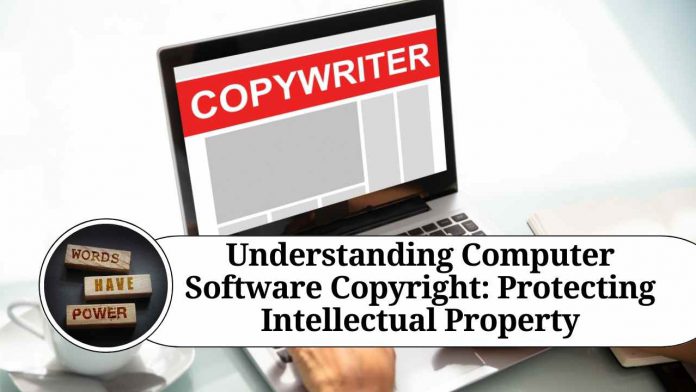Introduction
In today’s digital age, computer software plays a vital role in almost every aspect of our lives. Whether it’s the operating system on our personal computers or the apps on our smartphones, software is the driving force behind modern technology. As software becomes increasingly valuable, protecting intellectual property through computer software copyright has become essential. In this blog, we will explore the concept of computer software copyright, its importance, and the legal framework surrounding it.
What is Computer Software Copyright?
Computer software copyright refers to the legal protection granted to creators of computer programs or software. It is a form of intellectual property law that grants exclusive rights to the original creators or owners of software, preventing others from copying, distributing, or modifying their work without permission.
Copyright protection extends to both the source code (the human-readable instructions that make up the software) and the object code (the machine-readable version of the software). It covers various types of software, including applications, operating systems, databases, video games, and more.
Importance of Computer Software Copyright
- Incentivizing Innovation: Software copyright provides creators with the motivation and economic incentive to invest time, effort, and resources in developing new and innovative software. Copyright protection allows them to enjoy the benefits of their work by ensuring that others cannot simply copy and profit from their creations.
- Encouraging Competition: While copyright protection grants exclusive rights, it also encourages competition by preventing unauthorized copying or distribution. Competitors are required to develop their own original software or obtain proper licenses, leading to a more competitive and innovative software market.
- Promoting Economic Growth: The software industry is a significant contributor to the global economy. By protecting software through copyright, governments promote economic growth by attracting investment, fostering job creation, and facilitating technological advancements.
Legal Framework for Computer Software Copyright
Copyright protection for computer software is primarily governed by national laws, but there are international agreements that establish minimum standards of protection. One such agreement is the Agreement on Trade-Related Aspects of Intellectual Property Rights (TRIPS), administered by the World Trade Organization (WTO). TRIPS sets out standards for copyright protection, including software copyright, among its member countries.
In many jurisdictions, software is automatically protected by copyright as soon as it is created in a fixed form. However, registering software with the relevant copyright office provides additional benefits, such as the ability to seek statutory damages and establish a public record of ownership.
It’s worth noting that copyright does not protect ideas or functionality but rather the specific expression of those ideas in software. Therefore, while someone can create similar software with different code, they cannot directly copy the original code without permission.
Enforcement and Challenges
Enforcing computer software copyright can be challenging, primarily due to the intangible nature of software and the ease of digital reproduction. Some of the common challenges include:
- Piracy: Unauthorized copying and distribution of software, commonly known as piracy, continue to be a significant challenge. The ease of sharing digital files makes it difficult to prevent unauthorized duplication and use.
- Open Source Software: The rise of open-source software presents unique challenges to copyright enforcement. Open-source licenses grant users certain rights to view, modify, and distribute the software’s source code. However, strict adherence to the license terms is essential to prevent unauthorized use.
- International Jurisdiction: With software being easily accessible across borders, enforcing copyright becomes complex when infringement occurs in multiple jurisdictions. Harmonization of international copyright laws remains an ongoing effort.
Conclusion
Computer software copyright is a crucial aspect of protecting intellectual property in the digital age. It grants creators and owners of software the exclusive rights to their work, incentivizing innovation and fostering a competitive software market.
Other Related Blogs: Section 144B Income Tax Act
Frequently Asked Questions (FAQs)
Q. What is computer software copyright?
Computer software copyright is a form of intellectual property law that grants exclusive rights to the creators or owners of computer software. It protects their original work from being copied, distributed, or modified without permission.
Q. What does computer software copyright protect?
Computer software copyright protects both the source code (the human-readable instructions) and the object code (the machine-readable version) of the software. It covers various types of software, including applications, operating systems, databases, and video games.
Q. How is computer software copyright different from a software patent?
Computer software copyright protects the expression of an idea in software, while a software patent protects a specific invention or functionality of a software program. Copyright protects against unauthorized copying, while patents protect against unauthorized use of the patented invention.
Q. How do I obtain copyright protection for my software?
In many jurisdictions, copyright protection is automatic as soon as the software is created in a fixed form. However, it is advisable to register your software with the relevant copyright office to establish a public record of ownership and enjoy additional benefits, such as the ability to seek statutory damages.
Q. Can I copyright an idea for software?
No, copyright protects the expression of an idea, not the idea itself. The software must be developed and expressed in a fixed form, such as through source code or object code, to qualify for copyright protection.
Q. How long does software copyright protection last?
The duration of software copyright protection varies depending on the country. In most countries, copyright protection lasts for the author’s lifetime plus a certain number of years after their death. Additionally, some countries have specific rules regarding the duration of copyright for software.
Q. Can I use copyrighted software for personal use?
The terms and conditions of software use are typically outlined in the software license agreement. Some software may allow for personal use without restrictions, while others may limit usage to specific conditions. It is important to review the license agreement to understand your rights and limitations.
Q. What is software piracy?
Software piracy refers to the unauthorized copying, distribution, or use of copyrighted software. It involves using or distributing software without the proper license or permission from the copyright owner.
Q. What are the penalties for software copyright infringement?
Penalties for software copyright infringement vary depending on the jurisdiction and the severity of the infringement. They can include monetary damages, injunctions, fines, and in some cases, criminal charges.
Q. Can open-source software be copyrighted?
Yes, open-source software can be copyrighted. Open-source licenses grant certain rights to users to view, modify, and distribute the source code. However, strict adherence to the terms of the open-source license is crucial to avoid copyright infringement.




















